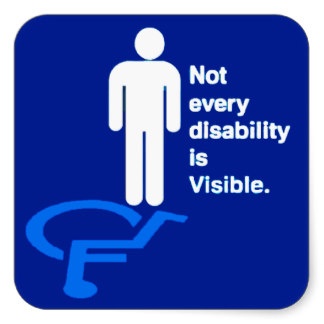 Some disabilities are more obvious than others. Many are immediately apparent, especially if someone relies on a wheelchair or cane. But others — known as “invisible” disabilities — are not. People who live with them face particular challenges in the workplace and in their communities.
Some disabilities are more obvious than others. Many are immediately apparent, especially if someone relies on a wheelchair or cane. But others — known as “invisible” disabilities — are not. People who live with them face particular challenges in the workplace and in their communities.
Carly Medosch, 33, seems like any other young professional in the Washington, D.C. area — busy, with a light laugh and a quick smile. She doesn’t look sick. But she has suffered from Crohn’s disease, an inflammatory bowel condition, since she was 13. There have been times, she says, when she’s “been laying on the floor in the bathroom, kind of thinking, ‘Am I going to die? Should I jump out in front of traffic so that I candie?’ Because you’re just in so much pain.”
More recently, she was diagnosed with fibromyalgia, a condition that leaves her in a state of full-body chronic pain and intense fatigue.
For Medosch and others who struggle with an invisible disability, occasional hospital stays and surgeries are not the hard part. Mundane, everyday activities can be more difficult.
“Washing my hair, blow-drying my hair, putting on makeup — those kind of activities can exhaust me very quickly,” says Medosch. “So you kind of blow-dry your hair and then you sort of sit down for a little bit.”
Walking to the subway or even bending down to pick something up can take a lot out of her. But that isn’t apparent from the outside.
“I kind of call it being able to pass,” she says. “So I can pass as a normal, healthy, average person, which is great and definitely helps ease my everyday life — especially in interactions with strangers, getting your foot in the door in a situation like a job interview.”
It is hard to pinpoint the number of Americans with an invisible disability, but it’s estimated there are millions. Their conditions may range from lupus to bipolar disorder or diabetes. The severity of each person’s condition varies, and the fear of stigma means that people often prefer not to talk about their illnesses.
Read more at NPR.org
